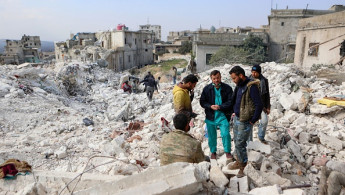With little international assistance, Syrians volunteer to help one another
With scarce international aid, Syrians have begun organising private humanitarian initiatives to support the victims of the devastating earthquake on 6 February, which killed at least 37,000 in Turkey and Syria.
Abdulrazzaq Hayane, a 28-year-old textile factory owner in Aleppo, began donating about two tons of cloth to needy families who lacked blankets in Syria's freezing cold just two days after the quake.
The 7.8 magnitude earthquake – the worst in a century – left up to 5.3 million Syrians homeless in temperatures which have dipped below zero over the past two weeks.
Hayane, along with ten of his friends, began to buy supplies such as "medicine, baby milk, diapers, blankets and food" with their personal savings.
They were able to secure enough supplies to help more than 1,000 people or about 250 families.
As news of Hayane's initiative spread, friends from outside the country began to donate, allowing him to benefit families in over 15 cities in the Aleppo governorate.
"I am a human being, not different from any other person under the rubble or whose house was damaged … I put myself in his position completely," Hayane told TNA, noting that his own house was severely damaged in the quake.
Hayane's donation drive is one of many small-scale initiatives as Syrians take it upon themselves to help one another, though most have little to spare.
Community Facebook groups are full of WhatsApp numbers to contact for medicine, housing and other basic supplies, across the country.
One such post on Saturday advertised shelters for "1,000 families in Daraa, 35 families in Damascus” and schools converted to shelters in Aleppo.
The international response to Syria's earthquake has been hamstrung by the politicisation of humanitarian aid and human rights organisations have been critical of the response thus far.
No UN aid reached opposition-held northwest Syria in the first four days following the earthquake. The UN said that the Bab al-Hawa crossing, which it uses to track aid into the northwest, was damaged, though journalists on the scene reported otherwise.
Before Monday, the UN was only authorised to use Bab al-Hawa for aid, despite the existence of other border crossings.
Thirty-five NGOs "demanded" a "massive scale-up of humanitarian response" in Syria on Tuesday, saying the "international community failed the Syrian people by not reacting fast enough."
Aid was quicker to reach regime-held areas, with a raft of Arab countries sending planes with humanitarian goods in the first days following the quake.
However, the media has been rife with reports of aid being stolen and sold on the black market.
Syria's Ministry of Internal Trade and Consumer Protection said that the ministry had caught two local officials distributing aid illegally, but claimed the problem had been "solved."
One man, Maaen Ali, who posted a video of himself criticising the pilfering of aid in Latakia had reportedly been arrested with no further news of his whereabouts.
"The strange thing is that individual assistance is double the assistance provided by the international community," Yahya Mustafa Shahada, who has run a relief campaign in Idlib in northwestern Syria since the earthquake, told TNA.
Shahada, who has collected aid through "dozens" of relatives and friends for about 300 beneficiaries, said that he was not surprised to see so many Syrians stepping up to help one another.
"You expect people to help because they love each other and fear for each other," Shahada said.
On Monday night, Syrian President Bashar al-Assad authorised the UN to use two additional border crossings into opposition-held territory, a move which should increase aid flow to the area.





 Follow the Middle East's top stories in English at The New Arab on Google News
Follow the Middle East's top stories in English at The New Arab on Google News
![The UAE is widely suspected of arming the RSF militia [Getty]](/sites/default/files/styles/image_330x185/public/2024-11/GettyImages-472529908.jpg?h=69f2b9d0&itok=Yauw3YTG)
![Netanyahu furiously denounced the ICC [Getty]](/sites/default/files/styles/image_330x185/public/2024-11/GettyImages-2169352575.jpg?h=199d8c1f&itok=-vRiruf5)
![Both Hamas and the Palestinian Authority welcomed the ICC arrest warrants [Getty]](/sites/default/files/styles/image_330x185/public/2024-11/GettyImages-2178351173.jpg?h=199d8c1f&itok=TV858iVg)